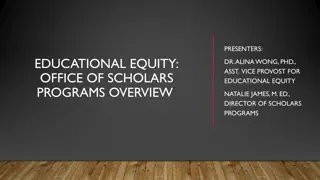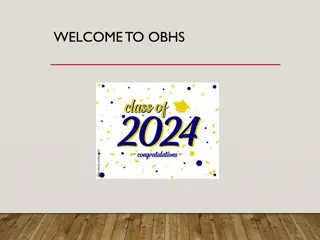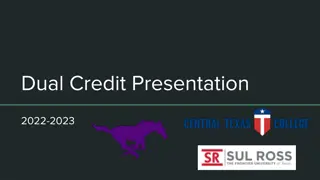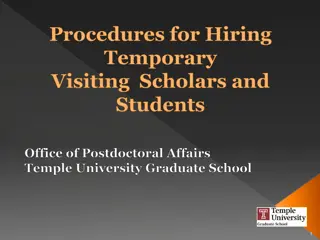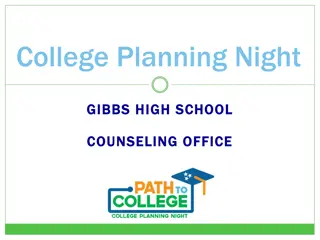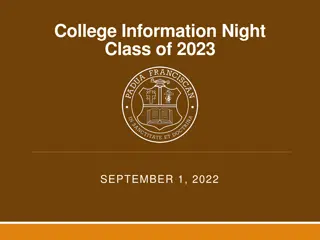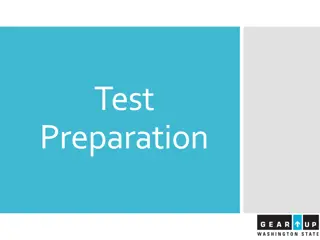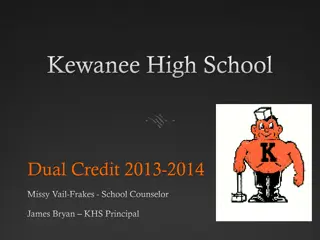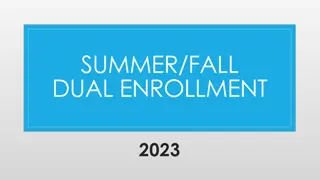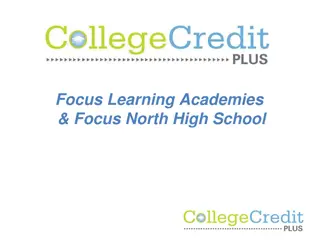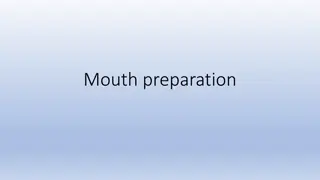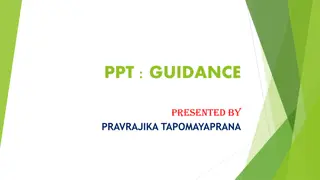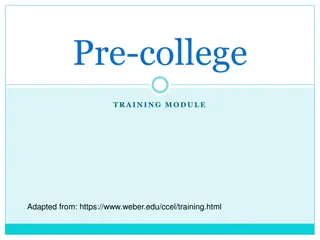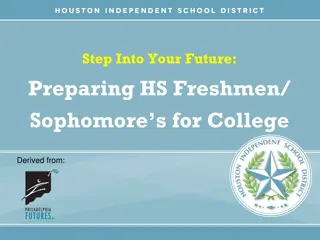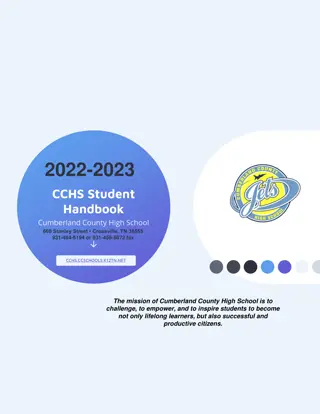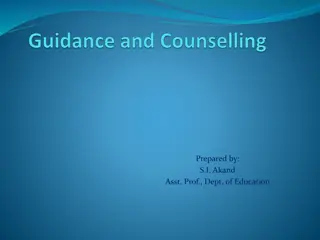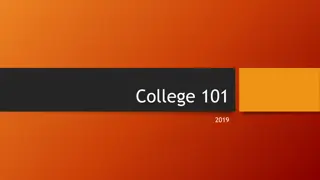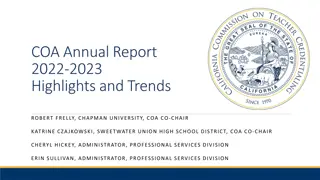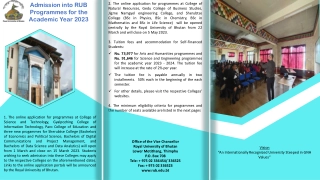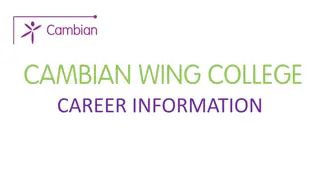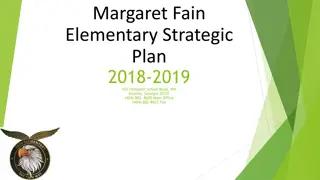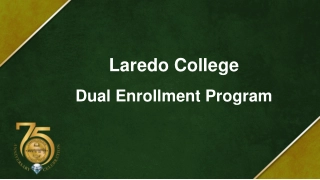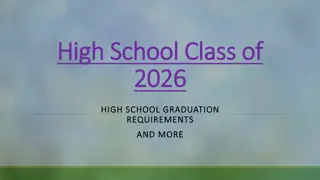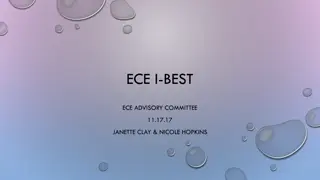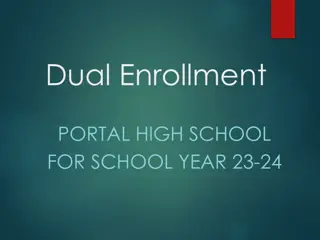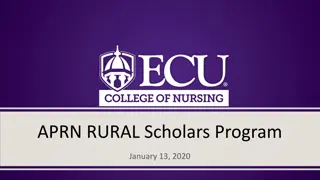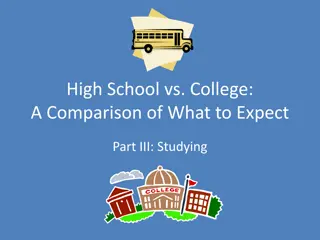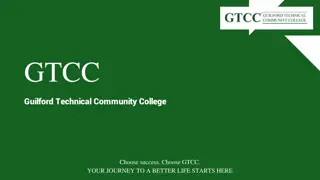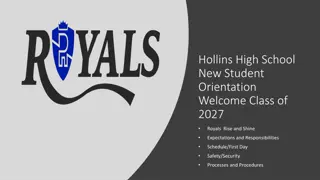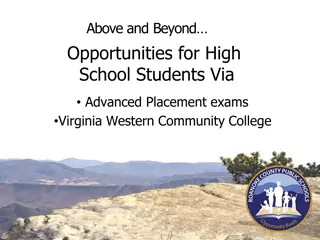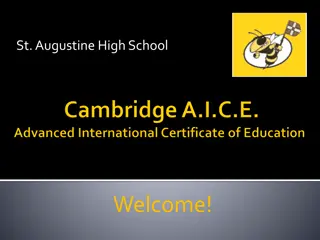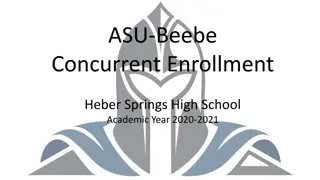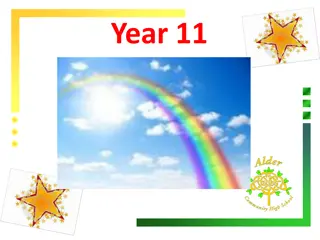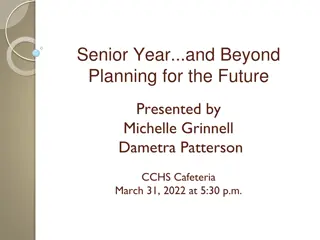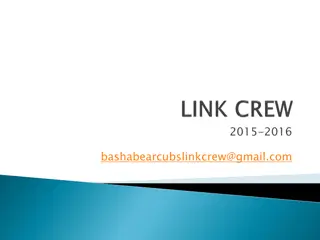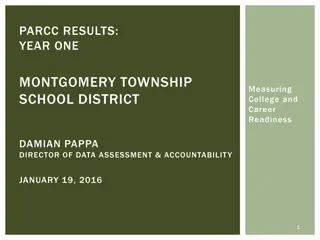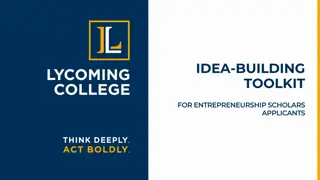Guidance for High School Scholars on College Preparation
Support your scholar by discussing their school, work, volunteering, and academic coaching progress. Explore factors colleges consider during admissions, such as core subjects, foreign language, and challenging courses. Encourage planning for junior and senior years focusing on honors vs. AP courses to prepare for college. Highlight graduation requirements, community colleges, and independent universities for better guidance.
Download Presentation

Please find below an Image/Link to download the presentation.
The content on the website is provided AS IS for your information and personal use only. It may not be sold, licensed, or shared on other websites without obtaining consent from the author. Download presentation by click this link. If you encounter any issues during the download, it is possible that the publisher has removed the file from their server.
E N D
Presentation Transcript
Chat with your neighbor(s) How is school/life/work/volunteering going for your scholar right now? How is CAT Mentoring/Academic coaching going for your scholar? Any conversation with your scholar about college since the last Saturday program? What questions/needs do you/your scholar have currently?
What are some factors that you think colleges consider when making admission decisions?
As you plan your high school experience, its helpful to use three things as a guide: 1) high school graduation requirements 2) college entrance requirements 3) personal interests and goals
High School Graduation Requirements ABSS Course Registration Manual Community Colleges These 58 colleges maintain an Open Door admissions policy which provides for the admission of anyone who is 18 or older or who has attained a high school diploma or its equivalent. Community Colleges Independent Colleges and Universities Entrance requirements for North Carolina s 36 independent colleges and universities vary among institutions. Prospective students should check the websites for individual colleges and universities to determine specific entrance requirements or call the admissions office. Independent Colleges and Universities
Encourage planning for junior and senior year Elon Academy Course Selection Worksheet.docx Virtual or online courses What are colleges looking for? Core subjects each year (math, English, social studies, and science) At least two years/classes of the SAME foreign language is a minimum (check your potential schools for requirements) A challenging/rigorous course schedule vs. straight A s (even senior year) That a student made the most of their academic environment/took advantage of the opportunities available to them
Honors Vs. AP (Advanced Placement) Honors: Level of expectation will help to prepare you for college AP: Workload and expectations similar to college Expect increasing workload per level When do we recommend honors or AP? If you have an A or B in a CP level of a prerequisite course and you have an honors level available at the next level, then it is Highly Recommended that you bump up to an honors level If you are making an A or a B in an honors level course then you should consider signing up for an AP level of the course. If you receive a C in an honors course, but have plans for improvement or feel more comfortable with a certain section of a subject (Algebra vs. Geometry) you may consider staying in the honors course
A few more notes about AP classes: How many AP classes can you, and should you take in 1 year? It depends on the student. The first time that a student is taking an AP course, it is recommended that they only take one AP course. After that, two per semester is ideal (4 per year). What are AP exams and why should students take them? If a student takes an AP course exam and receives a grade of 3 or higher out of a 5 point scale then they can receive college credit AP courses are less expensive than college courses Fee waivers or reductions are available and students should see their counselor as early as possible to discuss this Should my student take an AP class just to boost their GPA? The short answer is No. AP courses should be taken only in subjects where the student has clearly demonstrated the ability to perform well (i.e. they were receiving A s or B s in the Honors level) AND they have the desire to complete the extra work associated with an advanced course.
College classes off campus NC Career and College Promise out of Alamance Community College (ACC) for Junior and Senior year Tuition FREE!! High school junior or senior. Have an unweighted GPA of 2.8 or higher on high school courses. Demonstration of college readiness in reading, writing, and math on a state-approved assessment test (SAT, PSAT, ACT, P-ACT) Information in ABSS Course Registration Manual Junior Year: College Writing at Elon College Writing for Juniors Senior Year: Collegiate Start @Elon Collegiate Start
College Prep Honors AP/IB/CC/C A = 4 points B = 3 points C = 2 points D = 1 point F = 0 points A = 4.5 B = 3.5 C = 2.5 D = 1.5 F = 0 points A = 5 points B =4 points C =3 points D = 2 points F = 0 points Type of classes + type of grades= quality of GPA Quality of GPA = class rank Class Rank = scholarship and college opportunities
ETHEL English III- A COMPUTER APPS - A BIOLOGY A Concert Band- A Sociology @ Elon - C SPANISH I - A ENGLISH IV Honors - B Psychology @ ACC - C ELMER English III Honors- B COMPUTER APPS - A AP BIOLOGY - C Jazz Band - B AP U.S. History - B SPANISH III Honors - B AP ENGLISH IV C Art IV - A
ETHEL English III- A (4) COMPUTER APPS - A (4) BIOLOGY A (4) Concert Band- A (4) Sociology @ Elon - C (3) SPANISH I - A (4) ENGLISH IV Honors - B (3.5) Psychology @ ACC - C (3) ELMER English III Honors- B (3.5) COMPUTER APPS - A (4) AP BIOLOGY - C (3) Jazz Band - B (3) AP U.S. History - B (4) SPANISH III Honors - B (3.5) AP ENGLISH IV C (3) Art IV - A (4) GPA: 3.68 GPA: 3.5
The longer you wait the tougher it is to change. 10th and 11th grade are very important as you move toward college. In fact, your 11th grade year is your most crucial academic year. The minimum GPA for acceptance into most 4- year institutions is 3.0. GPA is updated 2x each year. Once at end of each semester. You can predict how your GPA may be impacted by taking regular vs. Honors vs. AP/dual enrollment/IB courses You can use this information to see how your GPA will be impacted by different potential final grades you may earn in your classes
An easy way for your student to demonstrate academic motivation and delve into areas of interest. They can take the opportunity to explore their creative side, develop language skills, and/or take higher level courses in core classes (e.g. math and history). Allows them exposure to topics and activities that may develop into interests, courses of study in college/major Beware the late in/early out/library or office assistant Importance of having a full schedule all four years
Anything your child is involved in that is not a high school course or paid employment Goes beyond school-sponsored groups/sports (band, Art Club, or basketball) Includes: Community Service/Volunteering Family Activities Hobbies
Extracurriculars and College (College Board) Encourage leadership roles, intentional selection, longevity of participation
Arts: theater, music, dance, painting, photography Church Activity: community outreach, helping the elderly, event planning, community suppers, bible school, Sunday School, offering, planning and helping with festivals Clubs: Key Club, Art Club, Spanish Club, Quiz Bowl Community Activity: community theatre, event organizing, participation in festivals Governance: student government, school committees Hobbies: collecting, model railroads, blogging, knitting Media: web work, school newspaper, yearbook staff Military: drill teams, ROTC Music: solo efforts, school and/or church related Sports: school, church, bowling leagues, dance, etc Family Activities: travel, bowling leagues, rock-climbing Volunteer Work and Community Service And ..ELON ACADEMY!!
Consider how to talk about it/write about it when it comes time for college/scholarship applications What skills do extracurriculars develop and stregthen in your student? Leadership Problem solving Time management Responsibility Community engagement Teamwork Cooperation Confidence Discipline Public speaking Communication skills Organization Keep track of extracurricular involvement
What is your scholar involved in? What skills do you think it builds for them? Are there any gaps in their high school experience currently? (e.g. courses they need- academic or elective, or extracurricular activities) What challenges does your scholar face in any of these areas? How have you overcome these?
April 13th Saturday Program Summer Program Paperwork/Information Spend most of the day with your scholar! Another resource: College Board resources for parents: Parent Action Plan 10th grade


